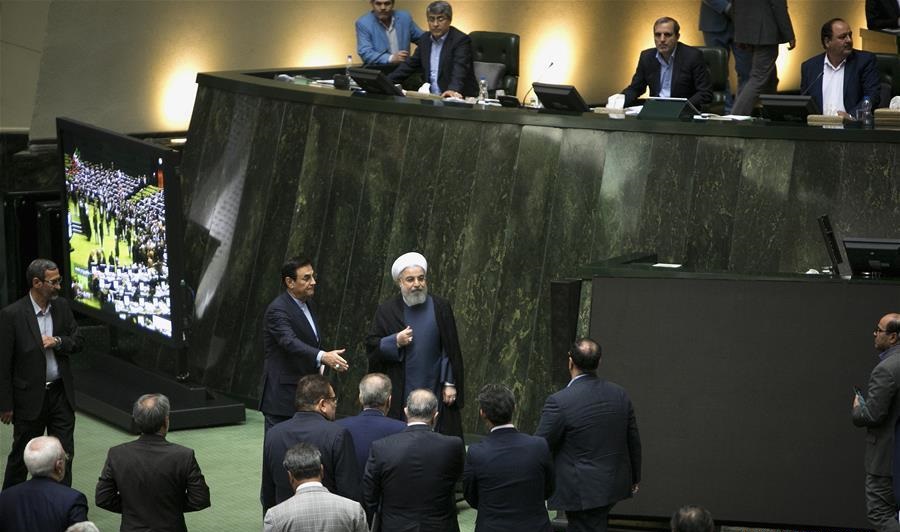Iranian President Hassan Rouhani’s cabinet is under pressure from hardliners and reformist politicians and policymakers to reshuffle his cabinet, due to the widening economic crisis that has followed U.S. President Donald Trump’s decision to pull out of the 2015 nuclear deal and re-impose sanctions.
On August 28, Rouhani attended a session at the Islamic Consultative Assembly to answer lawmakers’ questions about his government's failure to control goods smuggling, continuation of western banking sanctions, the unemployment rate, economic recession and an increase in the forex rate.
“Nobody, including the noble people of Iran, our friends and enemies around the world, must think that today is the start of a rift between the government and the parliament” the president said at the parliament, adding that “the problems in the banking system and the issue of upturn and the price of currency are equally important, but all of this is insignificant in comparison to people's trust and hope”, the official website of the Iranian presidential administration reported.
“We have to tell the great people of Iran that we won’t let the United States’ plots to be successful. People of Iran! Be sure that we won’t let a bunch of anti-Iranians who have gathered today in the White House to hatch plots against us,” Rouhani said.
The Iranian parliament impeached and dismissed the Minister of Cooperatives, Labour and Social Welfare, Ali Rabiei, who was sacked on August 8. The Economy Minister, Masoud Karbasian, followed behind him, on August 26, after months of mounting anger over the government's handling of an economic crisis.
Parliament recently announced its plan to impeach the Industry, Mining, and Trade Minister Mohammad Shariatmadari and Education Minister Mohammad Bathai, according to Radio Farda, the Iranian branch of Radio Liberty.
Meanwhile, Iran’s Intelligence Minister, Mahmoud Alavi, said on August 28 that the country’s security forces have arrested tens of spies working in state bodies, but did not mention when the arrests took place or which countries for whom the spies allegedly were working. Alavi indicated that many of the detainees were dual nationals, the Iranian Students News Agency (ISNA) reported.
“I have repeatedly asked people to inform us if they know any dual national. The intelligence ministry’s anti-espionage unit has successfully identified and arrested tens of spies in different governmental bodies,” Alavi was quoted as saying by the news agency ISNA.
The devaluation of the Iranian currency, the rial, as well as the rising cost of living during the past year, have led to several waves of protests.
On August 7, Trump imposed the first package of sanctions against Iran, targeting the country’s automobile sector, trade in gold and precious metals, the country's purchase of US dollars, as well as transactions involving its national currency. Meanwhile, all remaining American sanctions related to the energy sector and oil exports, and transactions by foreign financial institutions with the Central Bank of Iran will go into effect in November.
“It appears that President Rouhani’s remark during the recent parliament session has failed to satisfy most of his supporters,” Farhad Daneshvar, an Iranian political and economic expert, told Caspian News. “However, Iranian Supreme Leader Ayatollah Ali Khamenei has expressed his satisfaction with the outcome of the session describing it as “a glorious show of the power of the Islamic republic.”
“Hassan Rouhani during the session spoke about the country’s economic statistics but contrary to expectations refused to disclose reasons behind the dire economic situation,” Daneshvar explained. “On the other hand, he attempted to maintain unity among the officials and lawmakers.”
“In my opinion, the outcome of the Tuesday’s session and its impact on the Rouhani administration remain in question as the moderate president faces a possible risk of impeachment,” Daneshvar concluded.







 Russian peacekeeping forces, deployed in the Karabakh (Garabagh) region of Azerbaijan since 2020, have commenced their withdrawal from the area.
Russian peacekeeping forces, deployed in the Karabakh (Garabagh) region of Azerbaijan since 2020, have commenced their withdrawal from the area.
 The number of evacuees from flooded areas in Kazakhstan has reached 97,852 people, including about 32,856 children since March 27.
The number of evacuees from flooded areas in Kazakhstan has reached 97,852 people, including about 32,856 children since March 27.
 The Islamic holy month of fasting, Ramadan comes to an end this week with the celebration of a joyous festival called Eid (meaning “festival” in Ar...
The Islamic holy month of fasting, Ramadan comes to an end this week with the celebration of a joyous festival called Eid (meaning “festival” in Ar...
 Azerbaijan officially unveiled the logo for the upcoming 29th session of the Conference of the Parties to the United Nations Framework Convention o...
Azerbaijan officially unveiled the logo for the upcoming 29th session of the Conference of the Parties to the United Nations Framework Convention o...



